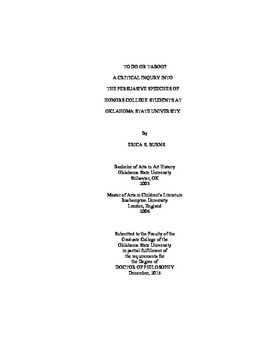| dc.contributor.advisor | Vasinda, Sheri | |
| dc.contributor.author | Burns, Erica S. | |
| dc.date.accessioned | 2017-02-22T22:12:16Z | |
| dc.date.available | 2017-02-22T22:12:16Z | |
| dc.date.issued | 2015-12 | |
| dc.identifier.uri | https://hdl.handle.net/11244/48959 | |
| dc.description.abstract | This study was a qualitative critical inquiry into the literacy learning of Honors College students at Oklahoma State University. Specifically, the told experiences of students learning to speak out for a significant social issue in a persuasive speech for an honors introductory speech communication class during the 2014-2015 academic year were explored. Research questions focused on how dialogue and reflection about the speech experience raised critical awareness and on uncovering elements that limited HCS in advocating for social change. Sub-questions explored what social issues Honors students took up, why they took up the issues, and conditions under which individual persuasive speeches were produced. | |
| dc.description.abstract | The purpose of the critical inquiry was to (1) engage Honors students in authentic dialogue and reflection in order to raise critical awareness and to (2) produce a critique of the social and educational elements that limited Honors students in reaching their full potential as advocates who speak out for social change. The study was based on dialogic interviews and documents. Data were analyzed using political analysis with components of narrative analysis. | |
| dc.description.abstract | Students felt that the camaraderie and bonding among students and with the course professor fostered a supportive and comfortable class climate that aided in open dialogue and exchange of ideas. However, the behaviors that HCS reported indicated that open dialogue, reflection, and authentic exchange of ideas were hindered through their enactment of strategies for maintaining peaceful relations. As a result, critical literacy development was hindered. | |
| dc.description.abstract | Authentic dialogue and reflection about the persuasive speech experience was found to raise critical awareness in Honors students. Dialogue and reflection empowered students to challenge existing social structures in ways not previously considered. Some students began to reimagine their motivations and the actions they encouraged for combating significant social issues while other students' ideas of an oppressive social system were reinforced. Authentic dialogue and reflection was found to be necessary in helping Honors students recognize the reproductive nature of social structures and its role in sustaining inequality. | |
| dc.description.abstract | The study concluded with an emphasis on providing Honors students with time and space for authentic dialogue and reflection during literacy learning experiences. | |
| dc.format | application/pdf | |
| dc.language | en_US | |
| dc.rights | Copyright is held by the author who has granted the Oklahoma State University Library the non-exclusive right to share this material in its institutional repository. Contact Digital Library Services at lib-dls@okstate.edu or 405-744-9161 for the permission policy on the use, reproduction or distribution of this material. | |
| dc.title | To do or taboo? A critical inquiry into the persuasive speeches of Honors College students at Oklahoma State University | |
| dc.contributor.committeeMember | Brown, Pamela U. | |
| dc.contributor.committeeMember | Krumm, Bernita L. | |
| dc.contributor.committeeMember | Sanders, Jennifer | |
| osu.filename | Burns_okstate_0664D_14429.pdf | |
| osu.accesstype | Open Access | |
| dc.type.genre | Dissertation | |
| dc.type.material | Text | |
| thesis.degree.discipline | Education | |
| thesis.degree.grantor | Oklahoma State University | |
